The big EA Sports FC 25 preview: a proper career mode update, a Football Manager-style tactics system, FUT tweaks, and more
Inside EA's "most significant change to tactics in over a decade".
FIF- sorry, EA Sports FC 25 has been officially unveiled, with England wonderkid Jude Bellingham this year's cover star. As usual, developer EA Sports has also outlined plans for a couple of big headline changes for the year - as well as a bucketload of little tweaks to go alongside them - but there are a couple of surprises. For one, FC 25 is going all tactical, with a new system with its customary proper noun, FC IQ, being introduced behind the scenes. And maybe even more surprising: there's an actual, proper update for career mode.
We've been out to EA Sports' studio in Vancouver to get a briefing ahead of time - where we also discussed EA Sports' opinions on a potential FIFA rival - and there's a lot of granular detail to run through, so we've broken this one down into sections for all the relevant parts of the game. On top of all of these, there's also a new "play experience", called Rush, which is available within all of FC 25's separate modes, and acts as a kind of replacement for and combination of Volta and Pro Clubs. We have a separate hands on preview of FC 25's Rush for much more detail there, coming very soon indeed.
FC IQ: the headline tactical revamp coming to FC 25 that's straight out of Football Manager
EA Sports match experience producer Thomas Caleffi described this as the "most significant change to tactics in over a decade" and a "beyond massive gameplay change". It does, on paper, sound like a genuinely big change to how the game works.
On the surface, it's a switch in how players and their responsibilities are handled in the game's tactical menus, and then beyond that, a change in the under-the-hood workings which dictate what those players do on the pitch, how they do it, and why.
First up, the old system of work rates - a set verbal description for how hard a player worked in attack and defence - has been removed, as this was the primary dictator of what sort of positions a player moved into at what moment. Now, that's dictated by the player's "role", and the "focus" they're given within that role. I can see the Football Manager players' ears perking up here - this seems to work extremely similarly to "roles" and "duties" in FM.
An example: a player in central midfield might be given the "Playmaker" role, as one of a few options (others spotted were: Box-to-Box, Half-Winger (AKA Mezzala), Holding, and Deep-Lying Playmaker), and then the choice of Balanced, Attack, or Roaming as a focus for that role. Different roles have different focuses available. The Box-to-Box role only has Balanced, for instance (another close relation to Football Manager, where the Box-to-Box midfielder role only has Support as a duty).
We haven't played a full game of 11-a-side with these in effect, but during a presentation at the studio, Caleffi showed a clip of how it might look in a match scenario. Featured in this was a right back with the Falseback role, a centre back with Centre Half, left back with Attacking Wing Back, right winger with Half Winger, and attacking midfielder with Shadow Striker. As the ball was played forward from defence and worked into midfield, the left back pushed up very high on the wing, the right winger drifted inside into a very narrow "half space" position, and the attacking midfielder made a run through the middle beyond the striker.
Crucially, all of this happened more or less simultaneously, which is a far cry from how things have worked up until now. FC, and before it FIFA, has long been a game of manually demanding runs from players at the individual push of a button, and so semi-automated movement like this feels like a major departure.
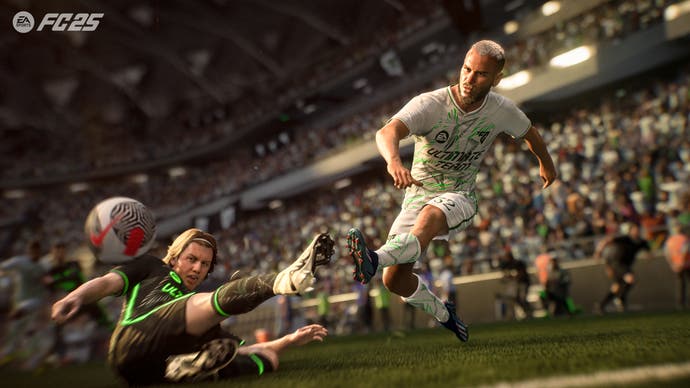
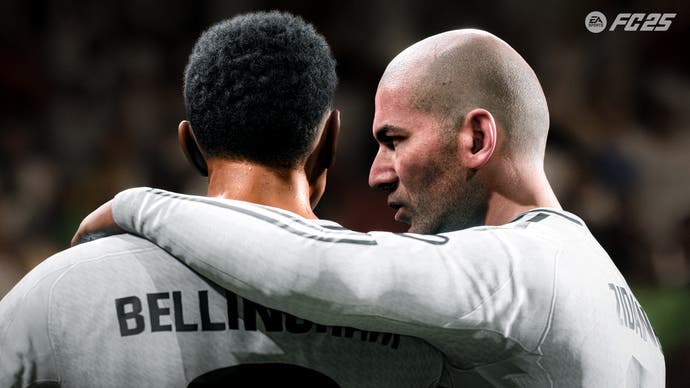
Beyond that main rework there are more big tactical changes, mind. In terms of team-wide tactics, there are now presets, such as Tiki-taka or Gegenpressing, that let you set your team up quickly, or much deeper sliders that can be adjusted on a 99-point scale (the maximum and minimum range of the slider, such as passing directness, being dictated by the broader overarching settings you choose). There's also a neat code system for sharing your tactics, so you can instantly generate a code and share it - across console platforms - with a friend or online.
There's also a new range of "smart tactics" implemented, which aim to make in-game tactics more "intuitive and adaptive". From the D-pad you can now bring up options for your overall tactical focus and quick tactics, initiating custom tactical plans you've set in advance, and get real-time tactical suggestions and prompts as the game goes on. A new commentary system has been added to react to the changes made, and FC 24's flashy-but-slightly-annoying AR graphics continue here, highlighting tactical elements on the pitch in real time. There's also a new subs system, where you're able to set up custom substitutes or use suggested ones on the fly.
Back to the impact on the individual players, and there's also one more layer of complexity to bear in mind: role familiarity. Each player has a setting for their familiarity with a given role. Base familiarity means they can play it, and is determined by position, so any left winger can play all of the LW roles to a base level. Role+ means they're accomplished in the role, meanwhile, and every player has at least one role to that heightened level. Role++ means they are "world class" in that role, and only "a few" players will have this at launch. Out of position players, meanwhile, will get a "simplified" descriptor instead.
All in all, FC IQ feels genuinely significant, particularly for a series that has long struggled with the nuances of player intelligence and tactical subtleties. How it works in practice is another question, but it is promising - even if FM fans might snort at the notion of any true rivalry for tactical depth.
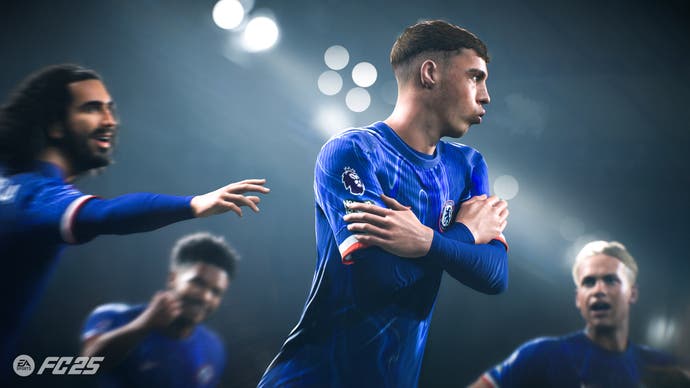
Career Mode gets its first proper update in a lifetime
The much-maligned Career Mode of FC 25 is finally getting some attention. You'll now be able to use "live start points" when beginning a save, which effectively means you can join a club at a specific point during the season, rather than always at the beginning. EA described this in a way that made it sound similar to some of the live service elements of Ultimate Team: as major events unfold in the real world of football, the plan is to then feature those as live starting moments in Career Mode.
Examples given were relegation dogfights, big derbies, real manager sackings, or moments like Jurgen Klopp announcing he's leaving Liverpool, and so on - these moments being labelled "Snapshots" in the game. All the details of that real-world season will be replicated, so injuries, goals scored, form, and other stats are all included, and you can also jump into these live stars in the player mode as well as manager mode, perhaps if you want to join part-way through a Golden Boot race as a leading centre forward.
Another first for Career Mode is the ability to manage and participate in training for youth players for the first time - their training sessions will mostly take form as Rush mode games between young players - and youth models have been significantly updated. In fact, there's a wider update to player faces in general in the form of something EA is calling EA Sports Cranium, which uses machine learning to give players that haven't been fully scanned a degree of genuine likeness in the game - with examples given across both men's and women's players. The difference between the generic faces of last year and the new models was pretty dramatic, even if the new faces were still less accurate than the full scans. There's also an impressive-looking character creator for making custom players, though we didn't see this in too much detail at the time.

Scouting, meanwhile, has also been improved - you can now scout more than 160 countries worldwide, an increase of more than 90 on last year, and can focus these searches down in much more granular fashion, like searching for specific roles such as False Nine rather than just a striker. On the topic of transfers, notorious gossip Fabrizio Romano is also in the game, as part of a new scrollable social media news feed where he'll be posting his trademark "Here We Go" announcements for in-game transfers.
Finally, the FC IQ system has been worked into Career Mode via training. The example given was for City forward Erling Haaland, who naturally has a base rating for the False 9 role because it's not natural for him, but who can be boosted up to a "Role+" rating via training that role in career mode. Notably, switching to the Gegenpressing tactical preset for the team automatically switched him to a Poacher, his natural "Role+" role, showing the way that impacts formations and the players within them. Basically: you'll want to play players in their natural roles as well as their natural positions, but you can modify those with training if you want to try something new.
Ultimate Team gets tinkered with, but not a lot more
FC's notorious Ultimate Team mode remains more or less the same as before, if our time at EA Vancouver was much to go by. The headline additions here are an increase in storage for duplicate untradeable player cards - you now have up to about 100 slots for them - and a general improvement in menu navigation to let you store them directly from the Squad screen. A dedicated SBC storage tab will then let you bring those into Squad Builder Challenges directly. A nice touch for hardcore players, but hardly a revolution.
Evolutions, introduced last year, have also been tinkered with. You can now evolve more players, with roughly seven times the amount of evolutions doable now, reducing the scarcity of evolved cards on the market. And you can also customise the colours and visuals on the cards, because some people moaned about the purple in FC 24.
Somewhat relatedly, FC IQ also shows up here as well, where players can now receive updated roles with special cards after real-world performances. An example given was Jude Bellingham putting in a great performance during the week in a deeper midfield role, and then getting a special card where he had the "Role++" modifier for the Deep-Lying Playmaker role in Ultimate Team. Manager cards have also been reworked - each manager will come with the ability to recreate their tactics with a button press, for instance having Pep Guardiola as your club's manager will let you instantly implement his Tiki-taka style of play.
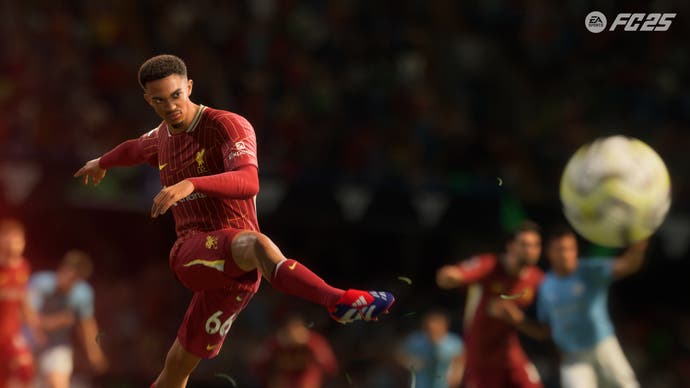
A little more interestingly there are competitive changes: Friendlies and Rivals have been "decoupled", with the goal of making friendlies feel more friendly. As Richard Walz, executive producer on Ultimate Team, explained, the previous setup "basically meant that when you went to play a match, the pool of players that you're playing against wasn't varied at all" between Rivals and Friendlies. "So the results - if you're playing against equally skilled players, it's a 50-50 chance, so any mistake that you make could be the reason why you lose the match. So with this matchmaking system, you're going to play against players of different skill levels more often." In other words, "sometimes you'll be able to beat your opponent more easily, sometimes you'll play against more skilled players."
There's now also a points-based system for weekly rewards, like the real world game - so three points for a win, one for a draw and none for a loss, with the aim of making draws feel a little less like a waste of time. And relegations are back in Rivals mode, after much requesting from the community.
What might feel most noticeable above all, however, is the addition of a single season pass for FC 25 that works across the entirety of the game's modes at once - Career Mode, Ultimate Team, and the reworked Clubs - so playing one mode alone should, in theory, give you as much progress through the pass as if you played all the modes equally. "You can play from Career Mode to earn season points," as Walz explained it to me. "So no matter where you're playing in those three areas, you'll be able to complete objectives - some objectives will be able to be completed everywhere." An example he gave was scoring a certain number of goals - this could be done in career mode or Ultimate Team, anywhere across the game. That said, "there's still going to be mode-specific objectives" in some form.
Lastly, the new Rush activity will be available in Ultimate Team, as it is in all other modes. You'll be able to bring players from your FUT squad into the mode, with live events running, such as "La Liga Rush", for limited periods - this example being based on a Spanish team winning the Champions League this year. There'll also be activities described as "a bit like lighter weight Squad Builder Challenges", which you can ignore, but if you choose to do them you'll naturally accelerate the rewards you can get from the mode. There's also a new currency, Rush Points, to be earned which go towards these Rush-based objectives, with weekly rewards tied into those.
A range of little tweaks across the rest of the game
Finally, EA has made a broad range of changes to elements of the game across the many modes. On the visual front, alongside the fancy new Cranium stuff, HyperMotion V, the trademarked proper noun brought in last year, now has full "lower body mimic" for players - in other words, their legs look more realistic now too. There are more women players included from the Women's Champions League, and more "goal post interactions" which means: several quite funny, and rather painful-looking animations for players accidentally running into a goalpost.
There are also new weather effects, with players slipping over occasionally in the wet (though this is automatically switched off whenever playing online). And the wind of a stadium - also modified by the size of the stadium, with smaller ones having a greater impact - is also a factor impacting the ball's trajectory from set pieces in particular. Continuing on the visual front, there's also now a choice of visual settings, between enhanced visuals or favouring resolution. The latter removes ray tracing, cloth simulation on shirts, some shadows and pitch detail for the sake of more pixels on screen, but both modes are still at 60fps.
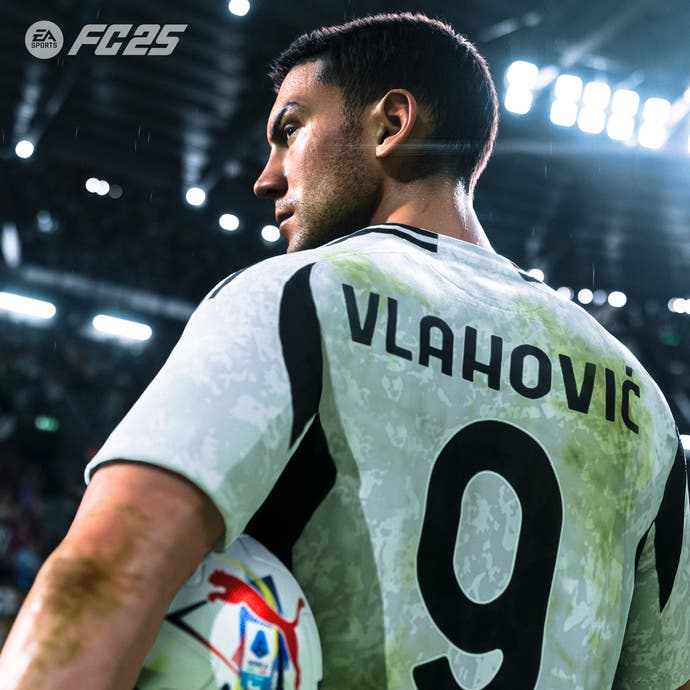
Goalkeepers have been reworked a little, with several new playstyles for those. Footwork lets GKs reach saves with their feet that would normally be missed. Deflector sees them parry saves far further away from the goal to an almost comical distance, rather than straight to an attacker's feet. Others include Rush Out, Cross Claimer, Far Throw, and Far Reach, though these weren't explained further.
There's a new mechanic - the Professional Foul, which lets you intentionally foul someone to stop them getting away from you on the counter attack, just like any good Manchester City player will demonstrate at the weekend. You can do this by pressing R1 + X on PlayStation, or RB + A on Xbox. Unlike Manchester City's players, however, this will always earn you a yellow card, so do mind out.
There are more mechanical tweaks: dribbling has been tidied up to result in a much cleaner 180-degree turn, and "blind" 180-degree passes, as in passes to people directly behind you on the pitch, are now far less accurate. There are also five new skill moves: the toe drag stepover, big feignts, the step over the ball, the heel nutmeg, and the drag turn.
All in all? It's a lot of changes, with FC IQ the most prominent and most promising. As always though, this one will be settled on the pitch.
This preview is based on a trip to EA Sports in Vancouver. EA covered flights and accomodation.







